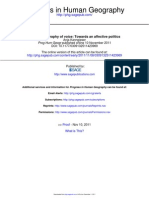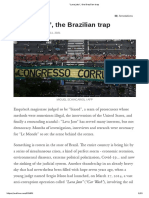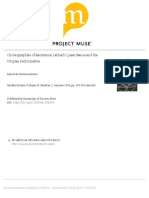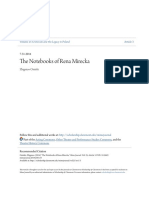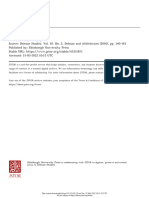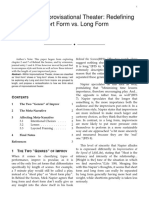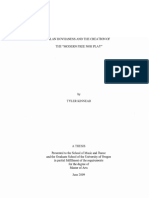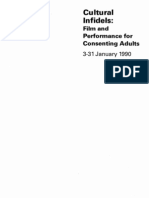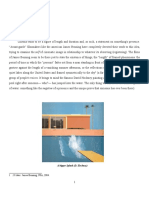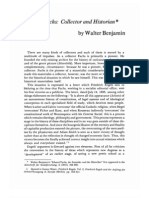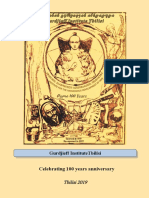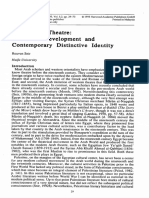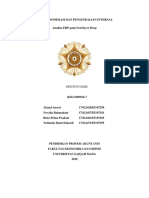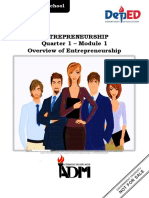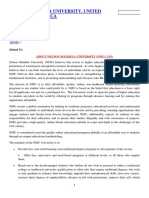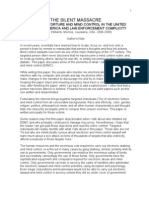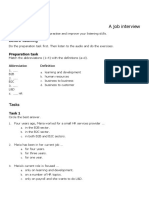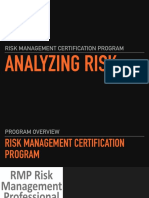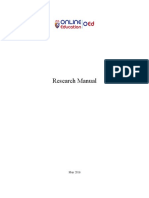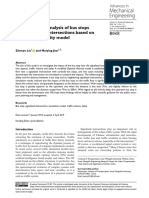Dorota Sieron-Galusek Lukasz Galusek BOR PDF
Dorota Sieron-Galusek Lukasz Galusek BOR PDF
Uploaded by
Levan KhetaguriOriginal Title
Copyright
Available Formats
Share this document
Did you find this document useful?
Is this content inappropriate?
Copyright:
Available Formats
Dorota Sieron-Galusek Lukasz Galusek BOR PDF
Dorota Sieron-Galusek Lukasz Galusek BOR PDF
Uploaded by
Levan KhetaguriCopyright:
Available Formats
Dorota Sieroń-Galusek,
Łukasz Galusek
Borderland
PDF-Muster LIT Verlag 17/07/19
Dorota Sieroń-Galusek, Łukasz Galusek
BORDERLAND
On Reviving Culture
LIT
PDF-Muster LIT Verlag 17/07/19
Cover: Photograph from the Archive of the Borderland of Arts, Cultures
and Nations in Sejny Foundation and Centre
Author: Kuba Kossak
The photograph on the cover of this book was licensed for publication
free of charge by the Borderland Foundation.
Translated from the Polish.
Title of the Polish edition: Pogranicze. O odradzaniu si˛e kultury
Published by: Kolegium Europy Wschodniej im. Jana Nowaka-
Jeziorańskiego, Wrocław 2012.
Translated by: Jessica Taylor-Kucia
Proofreading: Nicholas Hodge
This book is printed on acid-free paper.
Bibliographic information published by the Deutsche Nationalbibliothek
The Deutsche Nationalbibliothek lists this publication in the Deutsche
Nationalbibliografie; detailed bibliographic data are available on the Internet at
http://dnb.d-nb.de.
ISBN 978-3-643-91119-3 (pb)
ISBN 978-3-643-96119-8 (PDF)
A catalogue record for this book is available from the British Library.
© L IT VERLAG GmbH & Co. KG Wien,
Zweigniederlassung Zürich 2019
Klosbachstr. 107
CH-8032 Zürich
Tel. +41 (0) 44-251 75 05
E-Mail: [email protected] http://www.lit-verlag.ch
Distribution:
In the UK: Global Book Marketing, e-mail: [email protected]
In North America: Independent Publishers Group, e-mail: [email protected]
In Germany: LIT Verlag Fresnostr. 2, D-48159 Münster
Tel. +49 (0) 2 51-620 32 22, Fax +49 (0) 2 51-922 60 99, e-mail: [email protected]
e-books are available at www.litwebshop.de
PDF-Muster LIT Verlag 17/07/19
Inhalt
1 The wandering . . . . . . . . . . . . . . . . . . . . . . . . . . 1
1.1 Sub-existence . . . . . . . . . . . . . . . . . . . . . . . . 2
1.2 Restlessness . . . . . . . . . . . . . . . . . . . . . . . . . 4
1.3 The journey is above all a return . . . . . . . . . . . . . . . 6
1.4 A fixed point of reference . . . . . . . . . . . . . . . . . . 14
2 Atlantis . . . . . . . . . . . . . . . . . . . . . . . . . . . . . . 17
2.1 When did the end come? . . . . . . . . . . . . . . . . . . . 18
2.2 Fugitives from Atlantis. . . . . . . . . . . . . . . . . . . . 20
2.3 New barbarians . . . . . . . . . . . . . . . . . . . . . . . 23
2.4 In the light of u-topia. . . . . . . . . . . . . . . . . . . . . 26
2.5 Emptiness . . . . . . . . . . . . . . . . . . . . . . . . . . 29
3 Memory . . . . . . . . . . . . . . . . . . . . . . . . . . . . . 33
3.1 The thread of the story . . . . . . . . . . . . . . . . . . . . 34
3.2 Deeper descent . . . . . . . . . . . . . . . . . . . . . . . . 36
3.3 In the footsteps of the intractables . . . . . . . . . . . . . . 39
3.4 We remember, therefore we are . . . . . . . . . . . . . . . 43
3.5 A question of dimension . . . . . . . . . . . . . . . . . . . 45
3.6 Therapy or mutilation? . . . . . . . . . . . . . . . . . . . . 47
3.7 Memory of ancient time . . . . . . . . . . . . . . . . . . . 50
3.8 Community of memory . . . . . . . . . . . . . . . . . . . 56
3.9 Neighbours. . . . . . . . . . . . . . . . . . . . . . . . . . 59
3.10 However it was it is what it is . . . . . . . . . . . . . . . . 64
3.11 Towards a culture of remembering . . . . . . . . . . . . . . 67
3.12 Milieux de mémoire . . . . . . . . . . . . . . . . . . . . . 71
PDF-Muster LIT Verlag 17/07/19
Inhalt
4 Rootedness . . . . . . . . . . . . . . . . . . . . . . . . . . . . 77
4.1 Returnees to Place . . . . . . . . . . . . . . . . . . . . . . 80
4.2 Home, nest, temple. . . . . . . . . . . . . . . . . . . . . . 83
4.3 The Sejny Chronicles . . . . . . . . . . . . . . . . . . . . 88
4.4 Establish the place, establish the word . . . . . . . . . . . . 93
4.5 The rooted avant-garde . . . . . . . . . . . . . . . . . . . . 96
4.6 Playing here . . . . . . . . . . . . . . . . . . . . . . . . . 97
4.7 The Krasnogruda route . . . . . . . . . . . . . . . . . . . . 103
5 Connective tissue . . . . . . . . . . . . . . . . . . . . . . . . 111
5.1 A roof which does not obscure the heavens . . . . . . . . . 114
5.2 Borderlander . . . . . . . . . . . . . . . . . . . . . . . . . 118
5.3 Place of power, place of trial . . . . . . . . . . . . . . . . . 121
5.4 The borderland is an agora . . . . . . . . . . . . . . . . . . 129
5.5 Dialogue is building . . . . . . . . . . . . . . . . . . . . . 132
6 Active culture . . . . . . . . . . . . . . . . . . . . . . . . . . 137
6.1 Fraternal theatre . . . . . . . . . . . . . . . . . . . . . . . 141
6.2 A Time of Activism . . . . . . . . . . . . . . . . . . . . . 146
6.3 Participation . . . . . . . . . . . . . . . . . . . . . . . . . 147
6.4 The Workshop . . . . . . . . . . . . . . . . . . . . . . . . 150
6.5 Rebellion, artistry, and innovation . . . . . . . . . . . . . . 155
6.6 The secret of small numbers . . . . . . . . . . . . . . . . . 158
6.7 Profitless meaning . . . . . . . . . . . . . . . . . . . . . . 162
7 Hospitality . . . . . . . . . . . . . . . . . . . . . . . . . . . . 165
7.1 Friendship for life . . . . . . . . . . . . . . . . . . . . . . 168
7.2 Practitioner of ideas . . . . . . . . . . . . . . . . . . . . . 170
7.3 The encounter . . . . . . . . . . . . . . . . . . . . . . . . 171
ii
PDF-Muster LIT Verlag 17/07/19
Inhalt
Practising the tale . . . . . . . . . . . . . . . . . . . . . . . . . . 175
Dorota S IERO Ń -G ALUSEK
The Land without Borders . . . . . . . . . . . . . . . . . . . . . 179
Irena G RUDZI ŃSKA -G ROSS
A ‘Rather Long’ Book Jacket Commentary . . . . . . . . . . . . 183
Ian WATSON
Index of Proper Names . . . . . . . . . . . . . . . . . . . . . . . 187
Krzysztof C ZY ŻEWSKI English Bibliography . . . . . . . . . . . 192
iii
PDF-Muster LIT Verlag 17/07/19
The Land without Borders
Irena G RUDZI ŃSKA -G ROSS
It is quite rare to find a book about a phenomenon that perfectly reflects its
topic. The volume you are holding in your hands – Borderland by Łukasz
Galusek and Dorota Sieroń-Galusek – is just such a rarity. Its sensibility,
style and horizon of ideas correspond to the very nature of the Borderland
Foundation it describes. I am calling the topic of this book ‘a Foundation,’
but it is much more than an institution. It is a movement and a way of
life; and the book Borderland presents a history of that undertaking. Its
protagonists, the founders of that movement, decided almost thirty years
ago to live an authentic life, useful to them and to others. What followed is
an example of their ideas successfully woven into practice, a noble project
lived and implemented by noble individuals – the individuals that have
chosen to become ‘Borderlanders’.
Let me start with some information. Around 1989, as the communist
system in Poland was approaching its demise, a group of young people,
some from avant-garde theatrical circles, others with a traditional musical
background, decided to look for a place where they could work on their
art unhindered by political and commercial pressures. The times were ripe
for change, and the young artists were eager to find themselves where their
presence would make a difference. They had experience working ‘in the
provinces,’ and their art had been nourished by direct contact with their
local public. They were attracted to the places that were not easy, that were
burdened by history. In Poland, it is not difficult to find such places, as
the entire country has been living in the shadow of difficult history. They
settled on the border of Poland and Lithuania, in a place marked by conflicts
but still inhabited by several ethnicities. Once they had settled there, they
incorporated their group as the Borderland Foundation. It was May, 1990.
The name Borderland Foundation is composed of two interesting
words. In 1990s Poland, the term ‘foundation’ did not mean a wealthy
grant-giving institution. Quite the opposite, it was (and is) a term denoting
a tax-exempt recipient of grants. The second word in that name reflected
PDF-Muster LIT Verlag 17/07/19
Irena Grudzińska-Gross
what was most important – the idea that became a place. They had
chosen a vulnerable region, where their work promised discovery, recovery,
healing. From the initial group, the two founding couples remain the
animators, directors, and the soul of the foundation till today. They are
Krzysztof Czyżewski, Małgorzata Szporek-Czyżewska, Wojciech Szroeder
and Bożena Szroeder. What they started is now a multi-faceted way of
living and working. Their original seat was located in an old synagogue in
the town of Sejny; it is there that they have performances and exhibits. Also
in Sejny, they established an archive and information centre which contains
a research library. In Krasnogruda, not far from Sejny, they have renovated a
manor house that once belonged to the family of the poet Czesław Miłosz;
this is where many of their cultural and intellectual activities take place.
In the surrounding park some of the most wonderful performances and
meetings happen. Each of these places is magical and unforgettable.
The book beautifully describes Borderland’s activities and the ideas
behind them. The authors not only understand but also share the
intellectual, artistic and emotional intentions that govern the practice of
the Borderlanders. They have read the same books that inspired the
Borderlanders, they understand what the Borderland’s practice consists
of, what its objectives are. Though Borderland’s work and its conceptual
underpinning has evolved and developed with time, its constant mission
is to grow social connective tissue so as to mend society’s ruptures.
The authors of the book present the stages of the unending process
of the reconstruction of the diversity of traditions: together with the
Borderlanders, they listen to the voices of the past. They share the loyalty
towards the place, and to any of the places the Borderlanders collaborate
with, avoiding preferential treatment for majority cultures, for hierarchy
linked to state power. And, very importantly, they describe Borderland’s
effort to create a space for the voices of those who are not here anymore,
for the murdered, the expelled, and the forgotten. Such work requires not
only modesty and devotion, but also courage. The authors of the book write
about that courage, mentioning, for example, that the publishing house
of the Borderland foundation issued, among many outstanding books,
Neighbors by Jan T. Gross (2000); it was an act that opened a nationwide
debate about complicity in the Holocaust. The decision to publish that book,
180
PDF-Muster LIT Verlag 17/07/19
The Land without Borders
to open it to free access on the Foundation’s website, was one of the most
decisive among their many important activities to enlarge public discourse
and ground it in facts.
The book follows these and other decisions made by the people linked
with the Borderland group that positively influenced the cultural climate
of post-1989 Poland. The Borderlanders made their choices in a very
deliberate way and celebrated their maîtres à penser. The book Borderland
follows their inspirations, most of all the decisive influence of Czesław
Miłosz with his non-dogmatic attachment to the borderlands. Other books
that Galusek and Sieroń-Galusek have read together with the Czyżewskis
and Schroeders are those by the chroniclers of the borderlands Stanisław
Vincenz and Jerzy Stempowski, as well as the poetry of Paul Celan and the
theology of Simone Weil. The thought of Hannah Arendt is also present, as
are the political choices of Jerzy Giedroyc. The issues of active memory,
of living with the Other, and of embracing difference are presented in
this book as they developed in the active thinking and thoughtful acting
of the Borderland. The book maps the intellectual, conceptual work done
by Borderlanders and shows their fruitful collaboration with people from
other difficult places and regions. The reader of this book will have the
unique possibility of seeing the interlacing of social practice with its
intellectual origins. The authors join the Borderlanders: their book is an act
of bringing the reader into a cultural and ethical community. The territory
this community occupies has no borders and does not require passports.
May it host a community of people as large as possible.
181
PDF-Muster LIT Verlag 17/07/19
A ‘Rather Long’ Book Jacket Commentary
Ian WATSON
Director of the Theatre Program
Director of the Urban Civic Initiative
Department of Arts, Culture and Media
Rutgers University-Newark
Borderland: On Reviving Culture is a most timely book that tells the
story of a project for our times. It is the story of the Borderland
organization, which consists of two dovetailing initiatives, an international
NGO, the Borderland Foundation (Fundacja Pogranicze), and the more
locally and nationally focused Borderland Centre of Arts, Culture and
Nations. Borderland is based in the far northeastern corner of Poland close
to the borders of Russia, Lithuania and Belarus, where it has devised an
array of programs and initiatives designed to promote harmonious cultural
plurality in a region of inter-ethnic and religious tensions that date back
centuries. These initiatives have proven so successful since its formation in
1990 that the foundation has garnered financial support from international
organizations, such as the European Union and the Ford Foundation. It has
also been invited to work internationally in places such as the Caucasus
region (during the Bosnian conflict and currently in the Ukraine), in
Indonesia during religious riots in the early years of the new millennium,
and in recent times in Israel, among the Jewish and Palestinian peoples of
the West Bank.
This is the first book-length study of Borderland and its strategies
for change in English; but it is written with an insider’s eye by two
Polish scholars who have followed the organization for many years. It
explores Borderland’s origins. Its early inspiration was in the intellectual
vision of the Polish émigré literature smuggled into the country during
the communist regime. The book examines the organization’s roots in the
student activism of 1970s communist Poland as well as the alternative
theatre movement of the time, with particular reference to the famed theatre
PDF-Muster LIT Verlag 17/07/19
Ian Watson
group Gardzienice, where two of Borderland’s founders were actors. It
explains the links to Jerzy Grotowski’s notion of Active Culture that called
for abandoning the distinction between actor and spectator. It follows the
actual and metaphorical transition of Borderland’s founders, from their
urban home in the western city of Poznań near the border with Germany,
to their future home in the eastern rural village of Sejny. It follows the
evolution of Borderland from a theatre troupe into an organization rooted
in a social activism that places the onus for change on everyone involved. It
then charts that activism from its arrival in Sejny in 1990 as little more than
an ambition, to the official opening of Borderland’s international centre for
dialogue in Krasnogruda, in 2011, and beyond to the present day.
This is a volume rich with the history of an important organization,
which to everyone’s detriment is little known in the English-speaking
world beyond students of socially engaged practice. But this is a work
in the tradition of the best histories, because its authors, Łukasz Galusek
and Dorota Sieroń-Galusek, have a comprehensive understanding of the
intellectual and cultural world that blossomed in Poland following the
collapse of communism, a world that included organizations such as
Borderland. This deep, emic understanding and first-hand knowledge of the
organization’s initiatives for change allows the authors to avoid the cliché
of a strictly linear chronology that doggedly marks off facts and considers
them as they unfolded through time. Borderland: On Reviving Culture
is a nuanced work that traces Borderland’s inspirations and influences
as well as the intellectual and cultural milieu that shaped its evolution
from a group of young actors, with an unclear ambition unfettered by
communism’s demise, to an organization committed to a socio-aesthetic
practice that fosters tolerance and understanding in a world torn by
difference and conflict. This is a Borderland predicated upon the premise
that humans are essentially social animals and as such must embrace living
with the inevitable in any complex society, the ‘Others’ – those with
different histories, different beliefs, different values, different points of
view, different politics.
Borderland: On Reviving Culture is an important book because even
though Borderland is very much a product of its location, it provides a
window into at least one successful alternative to the world we live in.
184
PDF-Muster LIT Verlag 17/07/19
A ‘Rather Long’ Book Jacket Commentary
An alternative shaped by engaged tolerance with a proven track record in
which dignity, respect, and acceptance, rather than socio-ethnic origins,
a shared history or religious beliefs are the measure of human worth.
Unfortunately, these metrics are in short supply in a world in which angry
confrontation, the politics of fear and repression, and ignoring, banishing,
or worse crushing those who disagree with you are in the ascendancy. As
I am writing this, arguably the most divisive president in United States’
history, Donald Trump, presides over a nation in which the right and left are
all but at war with each other. China has imprisoned over 1 million Uighurs
in re-education camps in the west of the country. The UK is struggling
to reconcile a nation divided by Brexit as it flounders in its attempts to
extricate itself from Europe – an increasingly xenophobic Europe in which
nationalism is on the increase and that has all but turned its back on
those embodiments of the ‘Other’ seeking to escape the double jeopardy
of repressive regimes and crushing poverty in their homelands. It is only
a matter of weeks since the popular liberal-leaning mayor of Poland’s
fourth largest city, Gdańsk, Paweł Adamowicz, was stabbed to death at a
national charity event in the city; a heinous act attributed to the overwrought
political tensions between the left and the right in the country that spawned
Solidarity. Meanwhile, much of northern Africa struggles with terrorism
that tolerates no-one but its own; and then there is the Middle East of a
Syrian civil war; an Egypt at odds with itself; Israel and the Palestinians;
the proxy war of ideologies between Sunni and Shia; not to mention the
protracted conflict in Afghanistan.
I doubt that even the founders of Borderland would claim that the
organization’s initiatives are a universal panacea for a polarized world in
which the ideology of power shapes the character of nations. But it offers
hope where hope is starved of oxygen because as Borderland: On Reviving
Culture makes abundantly clear, there is at least one shining example that
offers an alternative to a world in which the ‘Other’ is a provocation to a
hate that undermines everyone’s humanity.
185
PDF-Muster LIT Verlag 17/07/19
Index of Proper Names
A Buczyńska-Garewicz, Hanna 13, 83,
Adaszyńska, Natalia 141 84, 92, 93, 133
Alpert, Michael 30, 99, 101 Büchner, Georg 27
Andrić, Ivo 134 Burzyński, Tadeusz 142, 148, 150
Andrukhovych, Yuriy 20 Byrscy, Irena i Tadeusz 145
Andrzejewski, Jerzy 3 Byrska, Irena 141, 145
An-sky, Szymon 98 Byrski, Tadeusz 141, 142, 143, 145
Arendt, Hannah 115, 131, 181
Assmannowie, Aleida i Jan 70 C
Celan, Paul 27, 93, 94, 95, 121, 136,
161, 181
B
Chwin, Stefan 3, 4, 6
Balĉytis, Vytautas 43
Cichocka, Lidia 143
Baranauskas, Antanas (pol.
Čolović, Ivan 127
Baranowski, Antoni) 63
Cywiński, Bohdan 39, 40
Barańczak, Stanisław 104 Czapliński, Przemysław 36, 62
Barba, Eugenio 141, 158 Czechowski, Waldemar 87, 166
Bauman, Zygmunt 165 Czyżewscy, Małgorzata i Krzysztof 9,
Bělohradsky, Vaclav 78 27, 47, 49
Bergson, Henri 74
Bernad, Jan 5 D
Bibo, Istvan 129 Dante, Dante Alighieri OFS 45, 46
Billig, Michael 118 Daunys, Vaidotas 43
Błoński, Jan 140 Davies, Norman 38
Bomse, Nuchim 8 Dawidejt-Jastrz˛ebska, Ewa 150
Borowiecka, Beata 56, 149, 150, 151, Dworakowska, Zofia 137
152, 156, 159, 161 Dzieduszycka, Małgorzata 140
Borowski, Piotr 5 Dziewulska, Małgorzata 140, 111, 112
Bottiger, Helmut 95 Dziubecka, Sławomira 144
Brakoniecki, Kazimierz 25, 42
Brandys, Kazimierz 2 E
Brook, Peter 140 Ekier, Jakub 95
Brotman, Stuart 99 Emerson, Ralph Waldo 171, 173
Buber, Martin 121 Ewagriusz, z Pontu 80
PDF-Muster LIT Verlag 17/07/19
Index of Proper Names
F Halecki, Oskar 129
Fałtynowicz, Zbigniew 103 Heidegger, Martin 13, 83, 84, 93, 135
Ficowski, Jerzy 8, 29, 30, 64, 119, 120, Hersch, Jeanne 55
160, 170, 171 Hesse, Hermann 137, 154
Figurski, Paweł 31 Hitler, Adolf 42
Filipow, Diementij 115 Huelle, Paweł 38
Filipowicz, Halina 157 Hulewicz, Witold 142
Fiut, Aleksander 40, 41 Husserl, Edmund 83, 84
Flaszen, Ludwik 155, 157
Forecki, Piotr 61, 62 I
Franaszek, Andrzej 40, 142, 143 Iskra, Małgorzata 143
Frankowska, Beata 4
J
G Jackowski, Aleksander 122, 149
Gawin, Dariusz 65 Jančar, Drago 42
Gawlik, Jan Paweł 143 Janczewska, Diana 150, 152, 153, 156,
Gadek,
˛ Mariusz 63 159
Geremek, Bronisław 14 Janik, Karina 144
Giacometti, Alberto 114 Janowska, Katarzyna 35, 47, 52, 168
Giedroyc, Jerzy 18, 42, 112, 125, 129, Jarry, Alfred Henry Marie 24
166, 170, 173, 181 Jaszewska, Maja 27
Ginsberg, Allen 137 Jawłowska, Aldona 137, 138, 139
Głowacki, Janusz 2 Jaworski, Dariusz 4, 71, 84
Godlewski, Grzegorz 11, 156, 12, 117 Jedlicki, Jerzy 60, 63, 162
Gorczyńska, Renata 26 Judt, Tony 72, 120, 172
Grass, Günter 38
Gross, Jan Tomasz 180, 59, 60, 61, 62, K
63, 64 Kal eda, Barbara 43
Grotowski, Jerzy 137, 138, 139, 140, Kamińska, Magdalena 40, 148
141, 142, 144, 154, 147, Kamiński, Jan 15
148–149, 150, 155, 157, 162, Kantor, Tadeusz 96, 158
172, 184 Kłoczowski, Piotr 120
Gruber, Ruth Ellen 99, 101 Kolankiewicz, Leszek 41, 117, 140,
Grudzińska-Gross, Irena 34, 60, 108, 162, 163
179 Konwicki, Tadeusz 2
Günter, Jan 144 Kopczyńska, Małgorzata 144
Gurdała, Mikołaj 99 Kornaś, Tadeusz 4, 50, 51, 138, 139,
151, 152
H Kornhauser, Julian 2, 91
Habermas, Jurgen 173 Kowalczyk, Andrzej Stanisław 19
188
PDF-Muster LIT Verlag 17/07/19
Index of Proper Names
Krakauer, David 99, 100 Miłosz, Andrzej 104, 106
Krishnamurti, Jiddu 137 Miłosz, Anthony 167
Krynicki, Ryszard 2, 7 Miłosz , Czesław 165, 167, 168, 169,
Kunat, Florentyna 105, 133 171, 177, 180, 181
Kunat, Gabriela 103 Miłosz, Oskar 78, 109
Kunat, Janina 103 Miłosz , Weronika 167
Kundera, Milan 114, 124 Mizera, Janusz 135
Kusek, Robert 56, 64 Moniuszko, Michał 102, 176
Kwas, Adam 42 Moorhouse, Roger 38
Kwiatkowski, Maciej Jozef 142 Mucharski, Piotr 35, 168
L N
Landsbergis, Vytautas 146 Niemojewski, Marcin 119
Lebecka, Magdalena 160 Nijakowski, Lech M. 57, 58, 61, 62, 65
Lem, Stanisław 3 Nora, Pierre 53, 54, 71, 72, 74
Leszczyński, Adam 61 Nyczek, Tadeusz 3
Leśmian, Bolesław 120, 160
Levinas, Emmanuel 121, 169 O
Limanowski, Mieczysław 142 Obirek, Stanisław 26
Lipscher, Winfried 25 Ołdakowska Kuflowa, Mirosława 21
Lipski, Jan Jozef 66 Orłowski, Hubert 25
Loew, Peter Oliver 26 Osadczuk, Bohdan 120
Lorca, Federico Garcia 16 Osiński, Zbigniew 140, 141, 145, 157
Osterwa, Juliusz 142, 145
M
Machul, Piotr 72, 138 P
Macianis, Paulina 56, 149, 150, 152, Papusza, Bronisława Wajs 8
153 Pärt, Arvo 120
Magris, Claudio 33, 120 Patocka, Jan 129
Majewski, Jozef 166 Peiper, Tadeusz 96
Malinowski, Jerzy 96 Platon 21
Marai, Sandor 19, 10 Por˛ebski, Mieczysław 96
Marecki, Piotr 4 Prymarka, Aneta 49
Markowski, Michał Paweł 165 Prysznak, Jan 80
Matusiak, Dariusz 86 Purchla, Jacek 26
Mekas, Jonas 28 Puzyna, Konstanty 141
Mencwel, Andrzej 40, 41
Micińska, Nela 19 R
Mieroszewski, Juliusz 129 Roitman, Anatol 107
Mieželaitis, Eduardas 8 Rosič, Ljubica 127
189
PDF-Muster LIT Verlag 17/07/19
Index of Proper Names
Rosiek, Stanisław 4 Szroeder, Bożena i Wojciech 8, 11, 12,
Rybałko, Alicja 167 31, 97, 105, 107, 108, 141,
Rzepka, Magdalena 143 151, 156, 171, 176, 180
Szumiński, Wiesław 12, 176
S
Sanetra-Szeliga, Joanna 64 Ś
Sawicka, Elżbieta 81 Śpiewak, Paweł 38
Schenkelbachowie, Cyna i Erwin 107 Światkowska,
˛ Ewa 49
Schindler, Oskar 153
Schulz, Bruno 29, 119, 120, 160 T
Şerban, Andrei 158 Taranienko, Zbigniew 4, 73, 139, 148
Simmel, Georg 173 Thoreau, Henry David 168
Sinan, Mimar 134 Tischner, Józef 170
Skarga, Barbara 175 Tokarczuk, Olga 38
Sławek, Tadeusz 168 Tokarska-Bakir, Joanna 63, 169, 170
Snopek, Jerzy 21 Tomczak, Aleksandra 151, 161
Sommer, Piotr 160 Toruńczyk, Barbara 125
Sporek-Czyżewska, Małgorzata 4, 5, 9, Traba, Robert 26, 36, 38, 42, 44, 45,
97, 105, 107, 108, 148, 151, 58, 66, 67, 70,160, 161
158 Turowicz, Jakub 151
Stalin, Jozef, właśc. Iosif 42, 144
Staniewski, Włodzimierz 50, 51, 73, V
138, 139 Venclova, Tomas 42, 43, 44, 81, 82,
Steinlauf, Michael C. 60, 100 107, 120, 146
Stempowski, Jerzy 18, 19 20, 22, 23, Vincenz, Barbara
24 Vincenz, Stanisław 165, 166, 168, 169,
Stewart, Ellen 158 172, 181
Stomma, Stanisław 40, 41 Vivekanada, Swami 137
Strauss, Deborah 99, 101
Strumiłło, Andrzej 10, 14, 149 W
Stryjkowski, Julian 3 Wajda, Andrzej 14
Szacki, Jerzy 118 Walas, Teresa 81, 82
Szaruga, Leszek 1, 3, 15, 36 Walczewska-Klimczak, Grażyna 56
Szejnert, Małgorzata 79 Waniek, Henryk 18
Shevchenko, Taras 8 Warhol, Andy 28, 190
Szroeder, Bożena 88, 149, 151, 158, Warschauer, Jeff 99, 101
159, 176, 180 Weil, Simone 68, 77, 79, 82, 92, 97,
Szroeder, Wojciech 5, 8, 11, 12, 31, 97, 181
105, 107, 108, 141, 151, 156, Wielgus, Stanisław 80
171, 180 Winiewicz, Rafał 105
190
PDF-Muster LIT Verlag 17/07/19
Index of Proper Names
Winikajtis, Wiktor 117
Wodziński, Cezary 165
Wojtkiewicz, Witold 120, 160
Worowska, Teresa 19
Wrobel, Wanda 138
Wyka, Anna 137, 138
Z
Zagajewski, Adam 2, 14, 15, 91
Zagańczyk, Marek 141
Zaleski, Marek 40, 122
Znaniecki, Florian 156
Ż
Żmijewska, Monika
191
PDF-Muster LIT Verlag 17/07/19
You might also like
- Branch Opening Procedures and ChecklistsDocument2 pagesBranch Opening Procedures and ChecklistsPeter Temu67% (3)
- Field Welding of Steel Water Pipe: AWWA StandardDocument28 pagesField Welding of Steel Water Pipe: AWWA Standardaes nazNoch keine Bewertungen
- SEEP Vol.29 No.3 Fall 2009Document94 pagesSEEP Vol.29 No.3 Fall 2009segalcenterNoch keine Bewertungen
- Apprehending The Idea Through Poetry and Danse - On MallarméDocument8 pagesApprehending The Idea Through Poetry and Danse - On MallarméDannyNoch keine Bewertungen
- Dawn Lundy MartinDocument5 pagesDawn Lundy MartinNina HoechtlNoch keine Bewertungen
- Professor Mark B. Sandberg-Ibsen's Houses - Architectural Metaphor and The Modern Uncanny-Cambridge University Press (2015)Document238 pagesProfessor Mark B. Sandberg-Ibsen's Houses - Architectural Metaphor and The Modern Uncanny-Cambridge University Press (2015)Jonathan Almeida100% (1)
- A Sonic Geography of Voice PDFDocument19 pagesA Sonic Geography of Voice PDFradamirNoch keine Bewertungen
- Virilio Visual CrashDocument6 pagesVirilio Visual CrashNikos EliadesNoch keine Bewertungen
- Auslander, Philip - Surrogate Performances - On Performativity - Walker Art Center PDFDocument22 pagesAuslander, Philip - Surrogate Performances - On Performativity - Walker Art Center PDFLaura SamyNoch keine Bewertungen
- Gurdjieff and Tiflis at The Edge of The Centuries (XIX-XX) PDFDocument18 pagesGurdjieff and Tiflis at The Edge of The Centuries (XIX-XX) PDFLevan KhetaguriNoch keine Bewertungen
- "Lava Jato", The Brazilian TrapDocument22 pages"Lava Jato", The Brazilian TrapMarcelo CordeiroNoch keine Bewertungen
- 01 - Quality Improvement in The Modern Business Environment - Montgomery Ch01Document75 pages01 - Quality Improvement in The Modern Business Environment - Montgomery Ch01Ollyvia Faliani MuchlisNoch keine Bewertungen
- 20190923swimming Class ProposalDocument9 pages20190923swimming Class ProposalFit AS50% (2)
- 4000 Most Common English WordsDocument97 pages4000 Most Common English WordsDanilo AmaralNoch keine Bewertungen
- David Shapiro PDFDocument17 pagesDavid Shapiro PDFSelahattin ÖzpalabıyıklarNoch keine Bewertungen
- Savran - Death of The Avant-GardeDocument34 pagesSavran - Death of The Avant-GardeJosé Miguel CuretNoch keine Bewertungen
- RIVIERA-SERVERA, Ramón. Choreographies of Resistance - Latina o Queer DanceDocument22 pagesRIVIERA-SERVERA, Ramón. Choreographies of Resistance - Latina o Queer DanceBruno De Orleans Bragança ReisNoch keine Bewertungen
- Varela 2001Document13 pagesVarela 2001Alberto HernándezNoch keine Bewertungen
- Reza AbdohDocument11 pagesReza AbdohRini TarafderNoch keine Bewertungen
- Sasnal WykładDocument24 pagesSasnal WykładJustyna CichonskaNoch keine Bewertungen
- The Road To Damascus by Strindberg, August, 1849-1912Document204 pagesThe Road To Damascus by Strindberg, August, 1849-1912Gutenberg.orgNoch keine Bewertungen
- Lyotard's Anti-Aesthetics - Voice and Immateriality in Postmodern ArtDocument10 pagesLyotard's Anti-Aesthetics - Voice and Immateriality in Postmodern Artkb_biblioNoch keine Bewertungen
- Trisha Donnelly Exhibition PosterDocument2 pagesTrisha Donnelly Exhibition PosterThe Renaissance SocietyNoch keine Bewertungen
- Notebooks of Rena MireckaDocument32 pagesNotebooks of Rena MireckaFranciele AguiarNoch keine Bewertungen
- Journal of Visual Culture: Translating The Essay Into Film and Installation Nora M. AlterDocument14 pagesJournal of Visual Culture: Translating The Essay Into Film and Installation Nora M. AlterLais Queiroz100% (1)
- Laidlaw - Free GiftDocument19 pagesLaidlaw - Free GiftChris JonesNoch keine Bewertungen
- Moten - Harney.the University and The Undercommons.2004Document16 pagesMoten - Harney.the University and The Undercommons.2004Martha SchwendenerNoch keine Bewertungen
- Antonin Artaud BibliographyDocument29 pagesAntonin Artaud BibliographyedrussoNoch keine Bewertungen
- Cixous CarrollDocument22 pagesCixous CarrollLucia NigroNoch keine Bewertungen
- J. Murphy 'Artaud's Scream'Document23 pagesJ. Murphy 'Artaud's Scream'Augustas SireikisNoch keine Bewertungen
- Genres in Improvisational Theater: Redefining Short Form vs. Long FormDocument4 pagesGenres in Improvisational Theater: Redefining Short Form vs. Long FormNicholas WenNoch keine Bewertungen
- How Do I Let You Die? Feb 2021Document27 pagesHow Do I Let You Die? Feb 2021Michele LeeNoch keine Bewertungen
- Deleuzes Critique of Representation Betw PDFDocument23 pagesDeleuzes Critique of Representation Betw PDFJulie WalterNoch keine Bewertungen
- DEFRANTZ-GONZALEZ - Black Performance Thoery (Intro)Document26 pagesDEFRANTZ-GONZALEZ - Black Performance Thoery (Intro)IvaaliveNoch keine Bewertungen
- 5 / Libidinous Mannerisms and Profligate AbominationsDocument24 pages5 / Libidinous Mannerisms and Profligate AbominationsRaimon RiberaNoch keine Bewertungen
- Edward Said and Jacques Derrida Reconstellating HumanismDocument30 pagesEdward Said and Jacques Derrida Reconstellating HumanismJulien Sorel100% (1)
- Being Sergei ParajanovDocument3 pagesBeing Sergei ParajanovVictorFugitaNoch keine Bewertungen
- Interbred and Intertwined - Collage Montage and The Trouble With TerminologyDocument7 pagesInterbred and Intertwined - Collage Montage and The Trouble With TerminologyAlexCosta1972Noch keine Bewertungen
- Potaznik ThesisDocument34 pagesPotaznik ThesisItzel YamiraNoch keine Bewertungen
- NQ27282 PDFDocument258 pagesNQ27282 PDFpershineoNoch keine Bewertungen
- Anticultural Positions . By. Jean Dubuffet ..... Lecture Given by Jean Dubuffet at The "Arts Club of Chicago" Thursday December 20th 1951Document2 pagesAnticultural Positions . By. Jean Dubuffet ..... Lecture Given by Jean Dubuffet at The "Arts Club of Chicago" Thursday December 20th 1951Jody TurnerNoch keine Bewertungen
- "Confessions of The Fox" Is A Cunning Metafiction of Vulpine Versatility - The New YorkerDocument3 pages"Confessions of The Fox" Is A Cunning Metafiction of Vulpine Versatility - The New Yorkercarlaj96Noch keine Bewertungen
- Music of The AbsurdDocument21 pagesMusic of The AbsurdMaria Clara CoelhaNoch keine Bewertungen
- The Sun Went inDocument32 pagesThe Sun Went indezbatNoch keine Bewertungen
- Audio Visual - On Visual Music and Related MediaDocument3 pagesAudio Visual - On Visual Music and Related MediaΕιρηνη ΚαλογερακηNoch keine Bewertungen
- Concrete Poetry Mary Ellen SoltDocument42 pagesConcrete Poetry Mary Ellen SoltHend KhaledNoch keine Bewertungen
- 10 1 1 867 152 PDFDocument146 pages10 1 1 867 152 PDFDavid Simon Hoyos GonzalezNoch keine Bewertungen
- Cultural Infidels: Film and Performance For Consenting AdultsDocument11 pagesCultural Infidels: Film and Performance For Consenting AdultslarrybobsfNoch keine Bewertungen
- Cinema/ldeology/Criticism: Jean-Luc Comolli and Paul NarboniDocument12 pagesCinema/ldeology/Criticism: Jean-Luc Comolli and Paul NarboniLlamil Mena BritoNoch keine Bewertungen
- Allen Ginsberg - Taking A Walk Through Leaves of GrassDocument43 pagesAllen Ginsberg - Taking A Walk Through Leaves of Grassagrossomodo100% (1)
- 1124227Document28 pages1124227buddha91Noch keine Bewertungen
- A Comparative Study of Mystical Experience Among Christian, Muslim, and Hindu Students in Tamil Nadu, IndiaDocument14 pagesA Comparative Study of Mystical Experience Among Christian, Muslim, and Hindu Students in Tamil Nadu, IndiaKeren MiceNoch keine Bewertungen
- Resonances of Audience SpaceDocument7 pagesResonances of Audience SpacePieter Verstraete, Dr100% (7)
- From Inner Speech To Dialogic SemiosisDocument14 pagesFrom Inner Speech To Dialogic SemiosistijouNoch keine Bewertungen
- Artaud, Various Writings On Cinema From Collected Works Volume IIIDocument37 pagesArtaud, Various Writings On Cinema From Collected Works Volume IIIrichardjcam100% (1)
- Decolonisingarchives PDF Def 02 PDFDocument111 pagesDecolonisingarchives PDF Def 02 PDFANGELICA BEATRIZ CAMERINO PARRANoch keine Bewertungen
- Rethinking Marxism - Vol 10 - 1998Document572 pagesRethinking Marxism - Vol 10 - 1998ZvonimirGNoch keine Bewertungen
- Guattari's Aesthetic Paradigm: From The Folding of The Finite/Infinite Relation To Schizoanalytic MetamodelisationDocument31 pagesGuattari's Aesthetic Paradigm: From The Folding of The Finite/Infinite Relation To Schizoanalytic MetamodelisationnatelbNoch keine Bewertungen
- Conflict of Gestures (Huberman)Document15 pagesConflict of Gestures (Huberman)bahman taherianNoch keine Bewertungen
- Drawing Out A New Image of Thought: Anne Carson's Radical EkphrasisDocument12 pagesDrawing Out A New Image of Thought: Anne Carson's Radical EkphrasisMilenaKafkaNoch keine Bewertungen
- The Crisis of PresenceDocument9 pagesThe Crisis of PresenceGabriel Herrera TorresNoch keine Bewertungen
- Eduard Fuchs: Collector and HistorianDocument32 pagesEduard Fuchs: Collector and Historianmroeder74Noch keine Bewertungen
- Peter Pal Perbart The Thought of The Outside, The Outside of ThoughtDocument10 pagesPeter Pal Perbart The Thought of The Outside, The Outside of ThoughtkattarinaSNoch keine Bewertungen
- Valerie A. Briginshaw - Dance Space and SubjectivityDocument257 pagesValerie A. Briginshaw - Dance Space and SubjectivityIgnacia Cortés Rojas100% (1)
- Cyber Psycho Geography - Mark AmerikaDocument54 pagesCyber Psycho Geography - Mark Amerikawalang_diyos100% (1)
- All That Fall Teacher GuideDocument12 pagesAll That Fall Teacher GuideClay GoldNoch keine Bewertungen
- Mapping Australian Higher EducatioDocument102 pagesMapping Australian Higher EducatioLevan KhetaguriNoch keine Bewertungen
- The Knight in The TigerDocument9 pagesThe Knight in The TigerLevan Khetaguri100% (1)
- Six Degrees of Francis BaconDocument3 pagesSix Degrees of Francis BaconLevan KhetaguriNoch keine Bewertungen
- 10 Amazing Things Kids Have Said About Past LivesDocument4 pages10 Amazing Things Kids Have Said About Past LivesLevan KhetaguriNoch keine Bewertungen
- 122 Mapping Higher Education PDFDocument87 pages122 Mapping Higher Education PDFLevan KhetaguriNoch keine Bewertungen
- 2015's Best New MuseumsDocument6 pages2015's Best New MuseumsLevan KhetaguriNoch keine Bewertungen
- Teacher Resources: Classroom ConnectionsDocument6 pagesTeacher Resources: Classroom ConnectionsLevan KhetaguriNoch keine Bewertungen
- 12 Essential Films For An Introduction To Turkish CinemaDocument7 pages12 Essential Films For An Introduction To Turkish CinemaLevan KhetaguriNoch keine Bewertungen
- European Arts Festivals. Cultural Pragma PDFDocument285 pagesEuropean Arts Festivals. Cultural Pragma PDFLevan KhetaguriNoch keine Bewertungen
- A New Orleans Exhibit Shows A Side of Tennessee Williams Few KnewDocument5 pagesA New Orleans Exhibit Shows A Side of Tennessee Williams Few KnewLevan KhetaguriNoch keine Bewertungen
- The Golden Curls of The Silver Age Mikh PDFDocument154 pagesThe Golden Curls of The Silver Age Mikh PDFLevan KhetaguriNoch keine Bewertungen
- Wild West Georgians Left A Legacy in Cowboy CultureDocument4 pagesWild West Georgians Left A Legacy in Cowboy CultureLevan KhetaguriNoch keine Bewertungen
- STA Silk Road Application Form.01Document4 pagesSTA Silk Road Application Form.01Levan KhetaguriNoch keine Bewertungen
- Gurdjieff Institute Tbilisi 100Document40 pagesGurdjieff Institute Tbilisi 100Levan KhetaguriNoch keine Bewertungen
- Drama AnylizeDocument91 pagesDrama AnylizeLevan KhetaguriNoch keine Bewertungen
- MPAA Theatrical Market Statistics 2016 FinalDocument46 pagesMPAA Theatrical Market Statistics 2016 FinalLevan KhetaguriNoch keine Bewertungen
- SIPIDocument4 pagesSIPIMuhammad Fauzan HappeNoch keine Bewertungen
- CLUP Final Revised Jan 2019Document281 pagesCLUP Final Revised Jan 2019Rome MolinaNoch keine Bewertungen
- Module Guide For 7053soh 2122sepjan Management Project (General)Document25 pagesModule Guide For 7053soh 2122sepjan Management Project (General)Manimozhi DevarajNoch keine Bewertungen
- Entrepreneurship Quarter 1 - Module 1 Overview of EntrepreneurshipDocument18 pagesEntrepreneurship Quarter 1 - Module 1 Overview of EntrepreneurshipBert Batoon MonteNoch keine Bewertungen
- Nelson Mandela University PDFDocument115 pagesNelson Mandela University PDFCarlos Chafla100% (1)
- The Silent MassacreDocument73 pagesThe Silent MassacreHRCNoch keine Bewertungen
- Performance Appraisal at UFLEX Ltd.Document29 pagesPerformance Appraisal at UFLEX Ltd.Mohit MehraNoch keine Bewertungen
- Ross 2001 - Does Oil Hinder DemocracyDocument38 pagesRoss 2001 - Does Oil Hinder DemocracyÖ. Faruk ErtürkNoch keine Bewertungen
- AO 2012-0012 New Classification of Hospitals & Other Health Facilities PDFDocument18 pagesAO 2012-0012 New Classification of Hospitals & Other Health Facilities PDFNiel HagapeNoch keine Bewertungen
- Teachinglec1 PDFDocument21 pagesTeachinglec1 PDFJessica GuidettNoch keine Bewertungen
- BP 22Document10 pagesBP 22Glenn TaduranNoch keine Bewertungen
- Standard No. 401 Interior Trunk ReleaseDocument2 pagesStandard No. 401 Interior Trunk ReleaseTomáš RybaNoch keine Bewertungen
- August 21 Listening 10Document2 pagesAugust 21 Listening 10Juan Andres Velez CalderónNoch keine Bewertungen
- Introduction To BioethicsDocument9 pagesIntroduction To BioethicsJes CmtNoch keine Bewertungen
- Site PlanningDocument26 pagesSite PlanningNurul AfiqahNoch keine Bewertungen
- SRS Library Management SystemDocument7 pagesSRS Library Management SystemSantosh ThakurNoch keine Bewertungen
- Program OutlineDocument23 pagesProgram OutlineDaniel KusnadiNoch keine Bewertungen
- 013 Thesis Capstone ManualDocument20 pages013 Thesis Capstone ManualDr Patrick CernaNoch keine Bewertungen
- Learning Mathematics Through DanceDocument8 pagesLearning Mathematics Through DanceNikoletta KouskouniNoch keine Bewertungen
- Impact of Bus Stop On IntersectionDocument11 pagesImpact of Bus Stop On IntersectionAmul ShresthaNoch keine Bewertungen
- Lawrence A5 Your Lms Dream TeamDocument7 pagesLawrence A5 Your Lms Dream Teamapi-330114970Noch keine Bewertungen
- Technical English 2 Quick Placement TestDocument4 pagesTechnical English 2 Quick Placement TestLR100% (1)
- NOTES ON IPC (RA No. 8293) - LAW On PATENTSDocument21 pagesNOTES ON IPC (RA No. 8293) - LAW On PATENTSedrianclyde100% (1)
- Publicity, Promotion and MarketingDocument8 pagesPublicity, Promotion and MarketingJay PrasadNoch keine Bewertungen






